You are visiting Liisbeth’s archives!
Peruse this site for a history of profiles and insightful analysis on feminist entrepreneurship.
And, be sure to sign up for rabble.ca’s newsletter where Liisbeth shares the latest news in feminist spaces.

VIEWPOINT
Leading From Inside a Cage
In the first week of February, a new gender equity campaign was launched.
Its name? #WeNeedBoth.
Its purpose? To ensure men were not excluded from panels on diversity. Supporters were encouraged to sign a pledge to ensure that this never happens again on their watch. By February 9, more than 90 A-list, Toronto-based CEOs, tech celebs, plus some of their employees (the majority were male) had signed.
Who founded it? According to media reports, it was founded by four WXN Top 100 corporate women leaders including Annette Verschuren, CEO of NRStor, and Linda Hassenfratz, CEO of Linamar, both of whom also serve on the Canada-United States Council for the Advancement of Women Entrepreneurs and Business Leaders.
The idea was said to be inspired by a more broadly defined gender equity panel pledge campaign in Australia. However, the Canadian adaptation focused on dealing with the apparent problem of too many all-women panels in sessions devoted to gender diversity. (See the screenshot below from February 7, 2018.)

The backlash and snark that followed on social and other media outlets was swift and merciless. Most wondered: On what planet is “not enough men on diversity panels” a problem?; Why the focus on “diversity panels”?; What data support the idea this is a notable problem in Canada (LiisBeth could not find a similar campaign in the U.S.) to the point of requiring a national corporate-led campaign to solve it?
Others were angered at the initiative’s blatant exclusion of trans and gender non-binary people. Fair point. The hashtag handle acknowledges the existence of only two genders.
A week later, red-faced organizers completely rewrote the #WeNeedBoth website and pledge. Now, instead of advocating for more men on diversity panels, signatories are pledging to ensure all genders on all panels.
In essence, #AllGendersMatter. (The screenshot below was taken on February 25, 2018.)
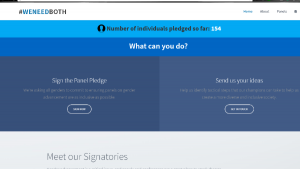
Fast forward to today.
Originally, the co-founders’ names were noted on the website. Currently, the website says the campaign was “founded by a group of women.” So if you wanted your name off the list or wanted to talk to someone about the site, you would have no idea who to call or who will answer the “contact us” email. So much for transparency and accountability.
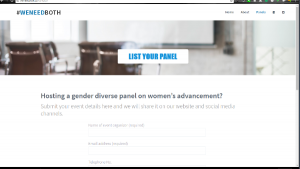
Marketplace Diversity?
Sure, people make mistakes. And the intentions were no doubt good. But one seriously has to wonder how the original campaign won approval by anyone in the first place, especially considering the people involved in creating and supporting it are all known corporate gender equity advocates. Hiding after the fact is not cool, either.
Following the campaign’s criticism, several signatories moved to distance themselves, downplaying their signature or involvement. Some simply said “Oops” on social media but justified their support anyway by saying the overall intent was good. Some signed without reading the pledge at all, saying they were heavily influenced by who else was on the list.
And while the pledge has changed to now reflect a flaccid #AllGendersMatter mindset, the hashtag #WeNeedBoth continues to refer to genders in binary terms. As of today, there are 172 signatures, a lineup that, by the way, looks a lot like the downtown Toronto’s Canadian Club luncheon reservations list.
Marketplace Diversity
The story of the ill-conceived, trans- and queer-excluding #WeNeedBoth campaign could be seen as an example of marketplace diversity (a riff off of Andy Zeisler’s term, marketplace feminism); supporters are quick to buy the feel-good T-shirt without bothering to critically consider the message emblazoned on the front.
One could also conclude this is just another case of corporate elite groupthink. Had any one of the founders, organizers or signatories reached out to oh, say, a woke college student, a staff member who perhaps does not report directly to them, a gender minority activist, or even a feminist of any gender outside of their circles, this embarrassing campaign launch could have been avoided.
Our Take?
The whole thing was just the consequence of lazy thinking and insularity.
I agree that pushing for gender diversity on most panels (not all depending on context) is an important tactic in the fight for gender equality and the advancement of women, especially if the women are actually allowed to hold the mic for more than a minute.
However, prioritizing gender diversity on panels without also prioritizing diversity of thought is a job only half done. Two people of the same gender with courage, free voice, combined with a non-colonial, non-heteronormative, wide-angle viewpoint are far more valuable on a panel than hearing from man and a woman who exist in the same cage, worry about conforming, and overall think alike.
The story of #WeNeedBoth shows that corporate leaders need to work harder at cultivating connections that go beyond their comfort zones if they really want to participate in, or be recognized for, moving the dial.
Our Panel Pledge?
If you ask me, a truly powerful corporate panel on the subject of gender equity and minority gender advancement would not only include people with testes, ovaries, both, or none, but also people from other walks of life like feminist artists, gender justice and labour lawyers, political activists, women’s labour historians, gender minority community leaders, indie media journalists, writers, filmmakers, and new knowledge creators (women’s studies or gender studies academics), many of whom have been working at the margins of power on this issue for decades.
I would also support a pledge that said that panelists cannot have participated on a similar panel topic within the same year. It seems the same people are on the same panels, all the time. Yawn. Let’s work harder to keep the discourse sparky and fresh.
Imagine. Just one phone call to just one person who does not work on Bay Street and the entire #WeNeedBoth fiasco could have been avoided. Remember, no one can truly drive social change from inside a gilded cage.
THIS MONTH ON LIISBETH

Feminist Bookstores Make a Comeback
Yes, feminism is a robust political movement. But it is also a major field of research, a community, and a complex worldview.
Feminism is also the foundation for much of today’s discussion on corporate-led diversity and inclusion. In fact, LiisBeth argues that feminism is the new management science of our time. We also believe that feminist thinking is, in fact, the new “design thinking” and that all future leaders will need to learn how to wield a feminist lens to succeed in the emerging era.
Perhaps it’s not surprising then that the feminist bookstore, armed with new technology, sources of funding, and an intersectional attitude, is making a comeback. This is good news as there is no better way to learn about feminism and its many facets than by becoming a patron of a feminist bookstore.
To learn more about the re-emergence of feminist bookstores, or how to become part of this kind of community of practice, read this month’s feature story, “The Reinvention of the Feminist Bookstore” by new LiisBeth contributor, Cecilia Keating.
LIISBETH FIELD NOTES
Boss! Boss! Da Budget! Da Budget!
Yesterday the Canadian federal government released its 2018 budget and whoa, it demonstrates a real commitment to improving support for women entrepreneurs. Sure, the devil’s in the details. And when it comes to programming, we pray that the money will go to women-led programs, and not just to incubators and accelerators with an “add women & stir” (Thank you Barb Orser!) approach.
Achieving its intended effect will be hard work. But from where we sit, it’s an awesome move forward.
We can’t wait to see the Ontario provincial budget which is coming next. Ontario is still the only province without a women’s enterprise strategy. Keep your fingers crossed that this will change.
In the meantime, watch for LiisBethian reader’s thoughts on the budget on our website in the coming days. If you did not have time to read the whole thing, here is a handy printable summary:
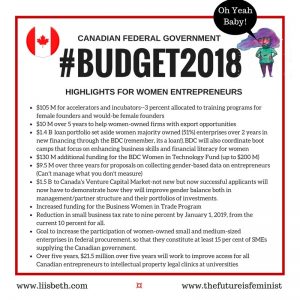
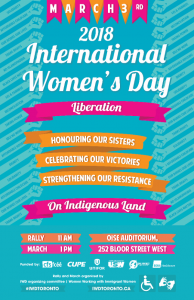
It’s International Women’s Day on March 3
What’s the difference between the March 3 International Women’s Day (IWD) March and the January 21 Women’s March?
Well for starters, the IWD March has been around for more than 100 years compared to just two years for the U.S. election–inspired Women’s March that’s now held in January. From having attended both over the past two years, I noticed that the IWD March is much smaller, but the message it sends is no less important.
Depending on the country and organization, this year’s theme varies in title but not in overall intent.
For example, the U.N.’s IWD 2018 theme is “Time is Now: Rural and urban activists transforming women’s lives.” This theme echoes “the priority theme of the upcoming 62nd session of the UN Commission on the Status of Women, International Women’s Day will also draw attention to the rights and activism of rural women, who make up over a quarter of the world population and majority of the 43 percent of women in the global agricultural labour force…”
In the U.K., the theme is #PressforProgress, which is “a nod to the growing global movement of advocacy, activism and support surrounding gender parity and sexism.” Inspired by the #MeToo and #TimesUp movements, the aim of the theme is to encourage people to continue the vocal fight for equality.
In Canada it’s #MyFeminism. The Canadian theme is focused on celebrating and recognizing the role feminism and feminists have played in shaping Canadian life.
If you missed the January 20 march, here is your chance to show lawmakers and politicians that this time, the fight for gender equity is not going to recede into the background—ever again.
If you cannot attend the march this weekend, check the long list of International Women’s Day events happening in your area.
LiisBeth hopes to see you there in Toronto. Information about the Toronto march can be found here. If you are looking for information on the IWD march in your particular country or city, click here.

Can I Wear My Pink Pussy Hat to the IWD March?
It’s true. The pink pussy hat became controversial during the January Women’s March. Some argued the symbol was trans exclusionary (not everyone has a pussy). Others said it was racist because not all pussies are pink. That’s why so many women left their pussy hats behind.
But not all. Some choose to interpret the symbol on their own terms. Others just reinvented the hat by knitting new ones that were multicolour (see photo above from the January Women’s March in Toronto).

New (and Only) Canadian Women’s Chamber of Commerce Launched!
After four months of focused efforts, and with the input of Women on the Move‘s Heather Gamble, Trista DeVries, and Nancy Wilson officially launched the first Canadian Women’s Chamber of Commerce (CanWCC) in January 2017 in response to the observation that Canada did not have one—though many other countries did.
The organization launched with over 60 members and aims to have over 1,000 by the end of 2018.
Why should women sign up?
DeVries remarked, “The first reason to sign up is simple: advocacy. Until now, there has been no national Chamber of Commerce advocating specifically for women’s economic priorities. The second reason? Women-led businesses have unique needs and the CanWCC is dedicated to addressing those needs.”
While the word “women” is in the organization’s nameplate, DeVries assures that the organization is committed to inclusive and anti-discrimination practices in relation to all transgender women, intersex women, genderqueer women, and non-binary participants.
When it comes to the group’s advocacy agenda, DeVries says that this is currently evolving as they discuss priorities with members and other women-led business organizations like the Women’s Enterprise Organizations of Canada (WEOC) over the next few months.
If you are interested in joining, click here. Membership rates start at $100 for businesses.

Innovate or Die
We all know women founders are underrepresented in science- and technology-led startups. But what’s more startling is that because there are few women in these spaces, many conclude that women are somehow less capable of or interested in innovation-based entrepreneurship.
Thankfully, Clare Beckton and Janice McDonald of The Beacon Agency just released a new study that proves this belief is pure bunk.
McDonald says that the 146 women interviewed were very clear: “If you don’t innovate, you die.”
It follows that if we cannot find a way to better support women-led innovations or enterprises, our economy’s potential will be forever under-realized.
WHAT WE’RE READING
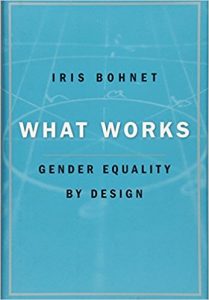
Diversity training programs have had limited success, and individual effort alone often invites backlash. Behavioral design offers a new solution. By de-biasing organizations instead of individuals, we can make smart changes that have big impacts. Presenting research-based solutions, Iris Bohnet hands us the tools we need to move the t caption text here. Use the block’s Settings tab to change the caption position and set other styles.

Talaga has written Canada’s J’Accuse, an open letter to the rest of us about the many ways we contribute ― through act or inaction ― to suicides and damaged existences in Canada’s Indigenous communities. Talaga describes gaps in the system large enough for beloved children and adults to fall through. It is impossible to read this book and come away unchanged.” ― RBC Taylor Prize Jury Citation
IN CASE YOU MISSED IT!
- The Canada-United States Council for the Advancement of Women Entrepreneurs and Business Leaders has released its first report. The key message? Leverage government and corporate procurement to help grow women-led enterprises. The next two reports are scheduled to be released in March.
- Further on the subject of directing a set percentage of procurement dollars to women-led enterprises, we encourage you to read this informative paper co-authored by Dr. Barbara Orser, Allan Riding and Julie Weeks in December 2017 titled “The Efficacy of Gender-Based Federal Procurement Policies in the United States.” The U.S. has had such policies in place for some time. The Council is recommending Canada adopt a similar policy. This paper points out that implementation is not as easy as it looks.
- Did you know LiisBeth compiled a terrific feminist entrepreneur reading list with the help of Feminists@Work? To download this must-have list for all feminist entrepreneurs, click here.
CAN’T MISS EVENTS
-
Building an Inclusive Enterprise: A Brief Introduction to the Feminist Business Model Canvas
Wednesday, March 7, 2018
6:30–8:30 PM
Women on the Move
2111 Dundas St. West, Toronto
Cost: $25 -
Building An Inclusive Enterprise: The Feminist Business Model Design Jam. Thursday, March 8, 2018
9:00 AM–3:30 PM
600 Rossland Road West, Oshawa, ON
Sponsored by LiisBeth and presented by Feminists At Work
Cost: Free! Register here. -
SheEO Canadian Activator Summit and Gala
Monday, March 5, 2018
9:00 AM–8:30 PM
The Symes
150 Symes Road, Toronto
Cost: $100–$150. Register here. - Toronto Women’s Entrepreneurship Forum
Friday, March 9, 2018
9:00 AM–4:00 PM
Toronto City Hall, Council Chambers
100 Queen St. West, Toronto
Cost: Free! Register here. - The Gender Revolution: Implications for Organizational Leaders
Saturday, March 10, 2018
9:00 AM–4:30 PM
Centre for Social Innovation, Queen’s University
Goodes Hall, Kingston
Cost: $99. Register here. -
CryptoChicks Hackathon and Conference
Friday, April 6 to Sunday, April 8, 2018
MaRS Discovery District
101 College St., Toronto
“This is an open invitation to take part in a bold blockchain event. Women are underrepresented in the crypto space and with your help, we want to change that.”
Cost: $50–$500. Register here.
That brings us to the end of our January/February combined newsletter.
Watch for additional new feature articles on feminist outsourcing plus more in March on our magazine site at www.liisbeth.com.
If you are looking for an easy way to support feminist entrepreneurs for International Women’s Day on March 8, look no further than considering a subscription to LiisBeth! We humbly remind you that subscriptions are $3/month, $7/month or $10/month.
We accept PayPal and credit cards. And we also now have a Patreon page!
Funds go directly towards paying writers, editors, proofreaders, photo permission fees, and illustrators. LiisBeth needs your love—and financial support.
The next newsletter is scheduled for late March 2018. In the meantime, enjoy the better weather! And we’ll see you out and about on International Women’s Day!

Petra Kassun-Mutch
Founding Publisher, LiisBeth
You are visiting Liisbeth’s archives!
Peruse this site for a history of profiles and insightful analysis on feminist entrepreneurship.
And, be sure to sign up for rabble.ca’s newsletter where Liisbeth shares the latest news in feminist spaces.





